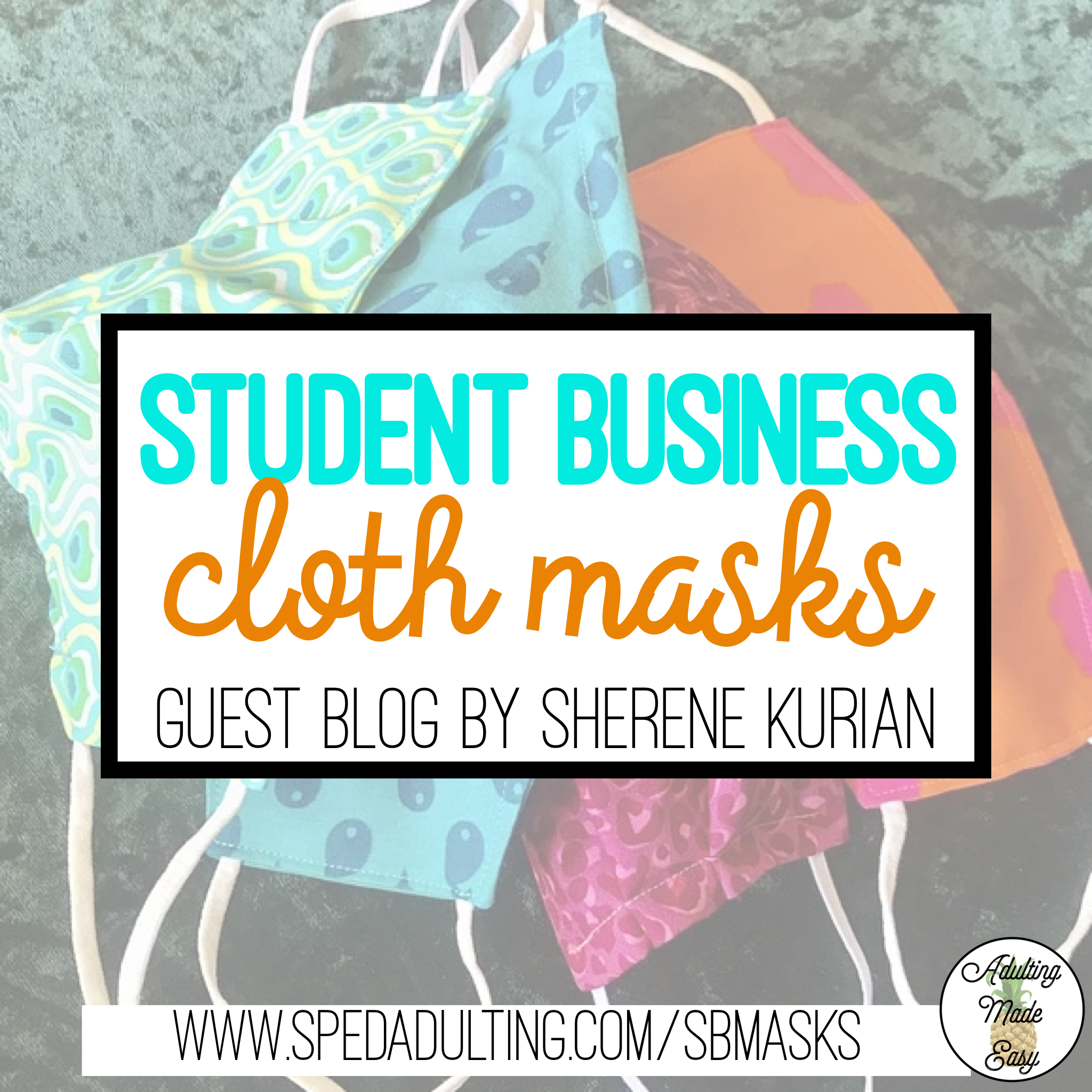Having a student business has SO MANY benefits. Depending on what your product or service is, you have the opportunity to practice independence, money math, cooking, responsibility, and so much more! In this series, various guest bloggers (teachers & special educators) will share their tried and true experience of starting and running a student business for special education students. Hopefully these posts will give you some great ideas or inspire you to start a classroom business of your own to teach students valuable vocational & life skills! Up next is a classroom that sells hand-sewn cloth masks!
How The Business Started:
At the time, I was working as a high school teacher at a special education day school serving students with moderate to severe disabilities. We were starting the year masked up and with a long list of COVID-19 restrictions. Before we dive into the details, I have to mention that the occupational therapist who I worked alongside throughout the school year was a vital part of this micro business and was the one who actually came up with the idea of turning everyone’s newest accessory into a student business idea!

Supplies:
The supplies needed were:
- Fabric
- Elastic (for ear loops)
- Sewing machine with adaptive equipment
- Stamps
- Envelopes
- Camera (could be an iPad or phone)
- Materials for packaging masks (we used yarn and laminated tags with our logo printed on them)

Time Commitment:
Students worked on the microbusiness at least twice a week, one of them being with the support of our occupational therapist. We would plug in additional work times as needed, particularly when we had a lot of orders to catch up on or if we weren’t able to complete everything in the allotted work times.
Student Tasks:
There are so many parts of running a business and students were actively involved in every part of it! We started off by explaining the business idea and having students vote on a name. We gave the students some choices, as well as the opportunity to share their own ideas. Students voted and all of a sudden, Mask-aroni & Cheese was born!

Moving forward, there were several roles and responsibilities that needed to be fulfilled. Students helped advertise the business by creating a logo, which would be turned into a flyer, then hung up around the school and emailed to district staff.
Then, students helped make the masks by cutting elastic to be used for the ear loops and using adaptive equipment to sew the fabric. Students also took photos of each mask and the unique designs to post to our online “store” (using both Padlet & Google Drive to take orders).
As orders began to roll in, students would help package and deliver masks to staff and students who ordered them around the school building. They would collect money, keeping track of the income they were earning. Some students were so excited about the business that they would make sure to tell staff they walked past in the hallway to order one! At one point, we were able to expand beyond just our school building and had orders from different parts of the country!
We were thrown for a loop when we transitioned into distance learning in November. Students would no longer be able to physically help make the masks, package them, or deliver them. We were able to keep the business going by having students help write thank you letters to customers! We would support students in writing these thank you letters via zoom, giving them sentence starters and ideas on how to thank those who have been supporting the business.

When we had made enough money, students were able to purchase one item for themselves. Their excitement and reactions to ordering and receiving the fruit of their labor were priceless! They purchased gift cards to their favorite restaurants, games, movies, and more. This helped solidify their understanding of the sequence of working, getting a paycheck, and spending money on desired items. From the first time they were able to purchase items with the money they earned, students were immediately motivated to continue running this micro business. It was amazing to see students take ownership of Mask-aroni in each of their individual ways.
IEP Goals:
- Email: Sending emails to remind people of the money they owe
- Budgeting: Keeping track of income and expenses; making purchases within a budget
- Work tolerance: completing a certain number of tasks
- Writing: writing thank you letters to our customers
- Daily living skills: addressing envelopes & sending mail
- Social communication: social interactions when delivering and/or advertising masks
- Fine motor skills: cutting fabric, packaging masks
Our microbusiness became well known across the district, even earning an award during a board meeting. I highly recommend implement vocational opportunities and student businesses in the classroom! There are so many benefits, but ultimately, it teaches our students the value of having a job! Thank you for reading!
Thanks for reading!
Sherene Kurian





